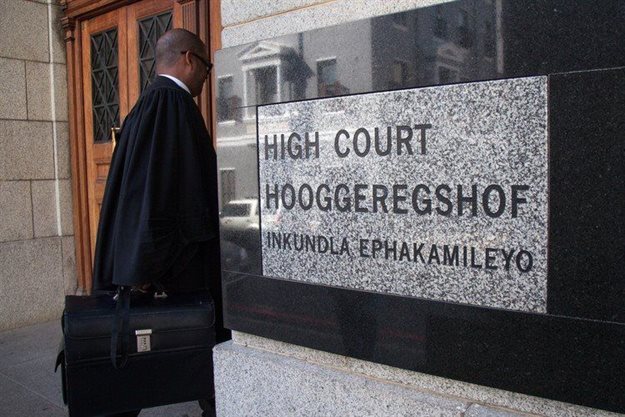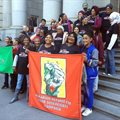South African legal history will be made in the Cape High Court on Tuesday [today] where the first part of novel litigation involving a R14.25m defamation suit by mining interests against activists has been set down for hearing. The defendants argue that it is a 'SLAPP' suit.

Judge Patricia Goliath of the Cape High Court will have to decide whether a defamation case brought by an Australian mining company is a SLAPP suit. Archive photo: Ashraf Hendricks / GroundUp
SLAPP is an acronym for Strategic Litigation Against Public Participation, and was coined by American academics in the 1980s.
The issue of legal protection against SLAPP suits has not yet been directly argued before South African courts.
SLAPP usually involves lawsuits in which major corporations with big budgets bring defamation cases involving huge damages claims against much smaller opponents and critics – such as environmental groups or individual activists – in order to intimidate them to silence and/or commit them to long and expensive litigation that exhaust their resources, preventing further criticism and possible judicial adjudication.
In a typical SLAPP suit, the plaintiff doesn’t necessarily expect to win its case.
The plaintiffs in Tuesday’s case are Perth-based Australian mining company Mineral Commodities Ltd (commonly referred to as MRC); its controversial chairman, mining entrepreneur Mark Caruso; MRC’s South African subsidiary company Mineral Sands Resources (MSR); and one of the companies’ BEE partners, Zamile Qunya.
MRC has been attempting to develop a titanium mine at Xolobeni in Pondoland for more than a decade, and has also been operating a mineral sands mine, Tormin, on West Coast beaches near Lutzville since 2014 through the subsidiary MSR.
Between them, the plaintiffs are bringing three defamation cases with total damages claims of R14.25 million (or if those claims fail, for public apologies) against six local defendants: Wild Coast community activist Mzamo Dlamini, environmental lawyer Cormac Cullinan, former Centre for Environmental Rights’ attorneys Christine Reddell and Tracey Davies, Lutzville (West Coast) community activist Davine Cloete, and social worker, author and commentator John GI Clarke.
The cases are all based on critical, and allegedly defamatory, comments and statements made variously by these six defendants in media articles, radio interviews, public lectures, social media posts, books, a letter to the mining minister and/or emails to mining analysts and investors between 2014 and 2018, all relating to the operations of the mining companies and the associated behaviour of Caruso and Qunya.
- In the first case, MRC and Caruso are each seeking R1m from Dlamini and R500,000 each from Cullinan, for a total of R3 million;
- In the second case, MSR is seeking R250,000 each from Reddell, Davies and Cloete, while Qunya is seeking R500,000 from Cloete, making a combined total of R1,25 million; and
- In the third case, social worker, author and commentator John GI Clarke is facing 28 claims of defamation: 13 claims by MRC totalling R4.5m and 16 claims by Caruso totalling R5.5 million (one of the claims involves both plaintiffs), totalling R10 million.
Two further linked cases were withdrawn last year. These cases – one civil and one criminal – were both brought by Gary Thompson, an Australian who was general manager at the Tormin mine when it opened in March 2014. He is no longer employed there.
Previously, the plaintiffs have denied that their defamation action constitutes a SLAPP suit, and the defendants deny having defamed the plaintiffs or, as an alternative defence, plead justification for their various comments.
Tuesday’s hearing will not deal directly with the merits of these alleged defamations but will consider the plaintiffs’ objections to two special pleas by each of the defendants in all the actions against them. Because the special pleas are identical, they have been combined into a single hearing.
The special pleas are entitled: “Abuse of process and strategic litigation against public participation” and “Failure to plead patrimonial loss and failure to plead falsity”.
(Patrimonial loss is actual financial loss that can be quantified, unlike non-patrimonial damages such as pain and suffering.)
The defendants – in legal terms special pleas are brought by “excipients” – argue that the plaintiffs’ action amounts to abuse of the court process “to achieve an improper end and to use litigation to cause the defendants financial and/or other prejudice in order to silence them; and/or violates the right to freedom of expression entrenched in section 16 of the Constitution”.
They argue that all the defamation actions against them should be dismissed in terms of common law (law derived from custom and judicial precedent, rather than from formal statutes).
If the court finds that existing common law doesn’t allow for such dismissal, then the common law should be developed by the court in order to bring it in line with the Constitution and to protect people from future SLAPP litigation, they say.
The plaintiffs, however, “take exception” to these pleas. They argue that the defendants are asking the trial courts “to take the extraordinary step of closing the doors of court on the plaintiffs, thereby denying them their rights in terms of section 34 of the Constitution, without any regard to the merits of the plaintiffs’ claims”.
Section 34 states: “Everyone has the right to have any dispute that can be resolved by the application of law decided in a fair public hearing before a court or, where appropriate, another independent and impartial tribunal or forum.”
The plaintiffs also argue that Parliament, rather than the courts, should decide whether a legal SLAPP defence should be introduced into South African law, and, if so, how this should be done.
At Tuesday’s hearing, Western Cape Deputy Judge President Patricia Goliath will consider the exceptions of the plaintiffs to the special pleas of the defendants.
If Goliath decides in favour of the plaintiffs, the special pleas will be removed from the defendants’ overall plea in the main defamation trial and they will not be able to argue these special pleas.
But should she rule in favour of the defendants, their two special pleas will be allowed to stand and will be decided by the judge hearing the main defamation trial.
Also, if the defendants are successful, their second special plea will be argued in the Constitutional Court.
Because of the constitutional significance of this case, two outside organisations have successfully applied to join proceedings as Amicus Curiae (Friends of the Court).
The first is the University of Cape Town that has joined the case in the interests of protecting academic freedom. This is because part of the alleged defamation relates to statements made by three of the defendants (Reddell, Davies and Cloete) during a UCT Summer School course titled “Mining the Wild and the West coasts: ‘Development’ at what costs?” in January 2017.
UCT says the three defendants were invited as activists and legal professionals involved in challenging mining “for specific academic purposes”, and it argues that the law should recognise a qualified privilege for academic speech.
The second Amicus Curiae is Wits University’s Centre for Applied Legal Studies (CALS), which points out that invoking the protection to the fundamental right to freedom of expression under section 16(1) of the Constitution, has not been litigated before.
“[CALS] submits that this court should affirm that this application is a SLAPP suit based on its demonstration that this application is without merit, and is intended to discourage the vindication of rights. Doing so would not be an extraordinary deviation from the principles of our common law,” it states in its heads of argument.
This article was originally published on GroundUp.








































